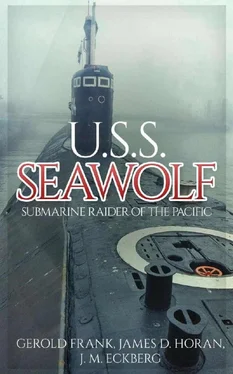“You on here?” I asked.
He nodded. “Just came aboard,” he said. He looked around critically. “Damn nice boat,” he said.
“You know, we’re only here for a little while,” I said. “We’re due out fast.”
He grinned a crooked grin I was to know and like after a while.
“I think I know where we’re going,” he said, “and that’s where I want to go. I’m too close to the States now. My name’s Zirkle.”
I introduced myself. “Well, where are we headed?”
“West, buddy, west—Asiatic stations,” he said mysteriously, and ducked aft to the mess room. That was my first introduction to the official pessimist of the Wolf and the loneliest man aboard. Zirk never talked about it, but the story was that he had a Chinese wife and children trapped somewhere in occupied China.
Later in the day, as I was bent over my radio reports, a dapper young fellow stuck his head in. “Eckberg here?” he asked.
“That’s me,” I said.
He stuck out his hand. “I’m your new radioman,” he said. “My name’s Paul Maley.”
He was replacing a man who had been advanced in rank and transferred to another ship. He was small and dark, with a determined chin, a wide mouth, a long thin nose, and, for a man, the prettiest eyes I’d ever seen.
“O.K.,” I said. “Do you know anything about this gear?”
He looked it over. “I’m not so hot,” he admitted. He was about twenty-three, and I liked him at once. “But I can learn,” he added.
“It certainly is a clean and snug-looking shack you have here.”
I thought it was, too. It had been painted and decorated since the first time I’d walked through the Wolf . The antenna systems, the direction-finder apparatus, the entire interior, ceiling and bulkheads, were painted white. But there was color, too. Beside my chair we had a small stool, part wastepaper basket, about a foot high, with a bright green leather cushion. I had a black typewriter resting in the well of my glass-covered desk. To set off the desk, I’d put some bright blue blotting paper under the glass.
Green linoleum had been laid on the deck. All in all, with Marjorie’s and Spike’s photographs high on the panel, and the radio and technical books on the bookshelf, it was a cozy little room.
“This is a good ship,” I said. “She’s not thoroughly clean yet, but that’s not the crew’s fault. We’re all working to make her pretty and pretty she’ll be. She’s going to be a real showboat. Come on, I’ll show you where your bunk is.” I took him into the forward torpedo room and showed him his bunk facing mine.
“O.K., Eck,” he said, and that was the way it has always been between us—calm, easy, friendly, like two brothers. Maley and I worked side by side. During attacks it would be Paul’s duty to keep a lookout for enemy ships while I concentrated on the target.
The crew of the Wolf had a special job in Pearl Harbor. We washed our clothes when we found the time and pressed our dress uniforms—whites and blues—on the mess hall tables with a small electric iron which we’d all chipped in to buy. The problem of what to do with soiled clothes, with long trips ahead of us, had to be solved. Sully had an inspiration.
“What we need is a washing machine, an electric one like I’ve got home.”
We appointed a committee which called on the skipper. He said, “That’s a damn fine idea. Go ahead.”
We had a bank aboard the Wolf , called the Seawolf’ s Slush Fund. If you were short of money and were going on liberty, you borrowed from the bank against your next pay day. You repaid with interest. Ten dollars cost you eleven dollars. Miss one payment, and you were taxed an additional dollar. This, with accumulated interest, was more than enough to pay for the washing machine.
Sully, as the moving spirit, and Mr. Deragon, representing the officers, went out to buy it. They walked into the biggest department store and, once inside, got into an argument as to which was married longer. The oldest husband in point of service should have the privilege of selecting the machine. As usual, Sully, who’d married at twenty-two, won the argument. He picked the machine—a gleaming white enameled beauty, big and round and perfect. It was delivered by ship’s boat. Getting it down the hatch was a work of art. The entire ship’s crew acted as sidewalk superintendents. When we finally squeezed it in, we didn’t know where to place it. A submarine is built for efficiency, and there isn’t any waste space. It could go into the washroom, but then there wouldn’t be any room for anyone to get in and wash.
Sully said, “The hell with that. We’ll change the washroom.”
With that he set to work tearing down the hand-and-face bowls in the washroom in the mess hall, as well as mirrors, soap dishes, and towel racks. The auxiliary gang worked on this special assignment of love for three days, moving them all to the forward bulkhead of the washroom. Everyone, including the officers, took a hand helping them. One shower room was not much use anyway, since it was loaded up with soap powder and salt-water soap for Gus Wright and the mess cooks, and nobody used it because it was too much trouble to move out the stuff and then put it back again. We placed the washing machine in front of the shower, and there it stayed.
We christened it Baby, and she was one of the real heroes of the Wolf —actually, the only heroine aboard. She took all kinds of punishment without grumbling. She was coddled, she was cussed, she was depth charged, she was damned—and she was loved. She was not always innocent. Sometimes she developed a temper, sometimes she was impatient, and sometimes she was as unpredictable as a woman. There was the afternoon I spent a good part of an hour sewing three buttons on a pair of shorts. Baby made short shrift of my work—probably sheer feminine jealousy. When I took them out, they were minus the buttons. I must have stood there and cussed her for five minutes. But from then on Baby was our sewing critic. If she didn’t rip off the buttons, you’d done a good job.
Before long the fore and aft part of the ship—the mechanics, or “Winton Wizards,” and the deck force, or “Deck Apes,” who were always competing against each other in baseball and liberty parties, were feuding about who could use Baby, and when, and why a clean machine like her had to take grease-stained dungarees in the first place.
Our second day at Pearl Harbor, Maley and I returned from town to find electricians spiking the Wolf ’s batteries. I’d heard of this, but I’d never seen it before. It’s an emergency measure to increase the speed and power of the boat, but at the expense of the battery’s length of life. Since a submarine moves on battery power when it’s submerged, only an emergency would compel the skipper to shorten the life of his batteries.
“This doesn’t look so good,” I said to Paul. “We’re heading for trouble, sure.”
The third day we took torpedoes aboard—not exercise torpedoes, but warheads. They went into place under my bunk.
There could be only one reason why we were getting war shots ready. That was to sink somebody. On the fifth night we pulled away from Pearl Harbor.
Now, for all practical purposes, we were on war service. The official declaration of war was still a year away, but our High Command was on the alert. We traveled with darkened ship; night lookouts were posted, four at a time, each to sweep one-fourth of the sea with powerful night glasses. We trained constantly; we were ready. The blow would come soon, no one knew when—but the Seawolf was ready.
CHAPTER II
The Wolf Strikes Back
MONDAY MORNING, December 8, 1941, the Seawolf lay in Manila Bay, anchored 600 yards from Cavite. We had been there for two weeks, waiting our turn to be overhauled. The port was as busy as a beehive with submarines. Two of them, the Sea Lion and Sea Dragon , our sister ships, were undergoing a complete yard overhaul. That meant removing all engines, tearing down the electrical systems, and then rebuilding the ship—a six- to eight-weeks job. The Dragon was almost completed, but the Lion ’s engines were still lying on the dock. The Wolf was scheduled to go in for repairs on Thursday. We had quite a gathering there that day. Most of our Asiatic fleet, under Admiral Thomas C. Hart, was based in Manila Bay, its home port, and I should judge that at least thirty submarines were almost within shouting distance. Three submarine tenders—the Holland, the Otus and the Canopus —were on hand, too. They carried torpedoes, submarine spare parts, provisions, and stores. Admiral Hart himself was in Manila that day.
Читать дальше






![Hubert Bancroft - The Native Races [of the Pacific states], Volume 5, Primitive History](/books/749157/hubert-bancroft-the-native-races-of-the-pacific-s-thumb.webp)

![Hubert Bancroft - The Native Races [of the Pacific states], Volume 1, Wild Tribes](/books/750126/hubert-bancroft-the-native-races-of-the-pacific-s-thumb.webp)



![Edward Ellis - Adrift on the Pacific - A Boys [sic] Story of the Sea and its Perils](/books/753342/edward-ellis-adrift-on-the-pacific-a-boys-sic-s-thumb.webp)